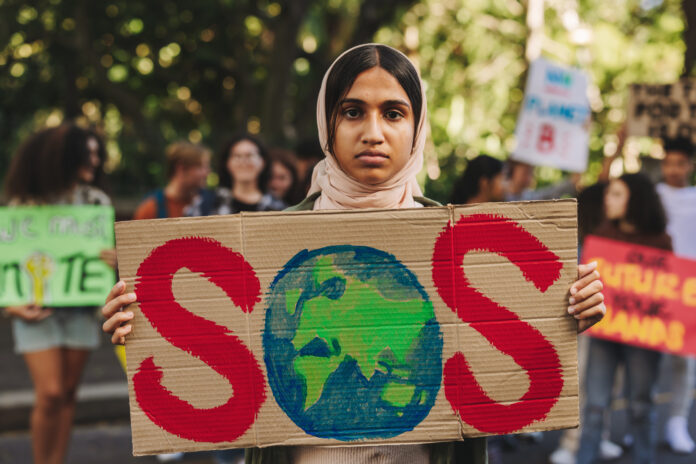Climate change is devastating for all of creation, however its impacts are unfairly distributed. The poorer countries of the global south with the least amount of warming emissions are bearing the brunt of the crisis, while the rich nations of the global north are less impacted despite their high share of emissions. Many countries of the global south, including Sudan, Pakistan and Bangladesh, with millions of marginalized people including Muslims, are battling disproportionate impacts of a climate catastrophe they did not cause. This disparity underscores the imperative for climate justice and Muslims worldwide must start leading this fight.
A study predicts that the global cost of loss and damage from climate change could hit $580 billion by 2030, soaring to over $1 trillion annually by 2050. However, Africa and Asia are at the most risk from extreme impacts of climate change, where more than 75% of the world’s population lives.
Unfair Distribution of Climate Change: Global South vs. Global North
Several reasons account for the unequal distribution of climate risks between the global south and global north. The major contributing factor is historical injustices rooted in colonialism and the slave trade. This legacy renders the global south more exposed to climate disasters, with a lack of resources making recovering from frequent climate disasters even more difficult.
In contrast, the age of industrialization in the global north with advanced economies has been synonymous with carbon pollution. Industrialization has historically been coupled with carbon emissions, as the mechanism for development sought a heavy reliance on fossil fuels. As a result, the carbon-led development in the global north has happened at the cost of an ecological demise after stretching Earth’s planetary boundaries. Consequently, underprivileged communities are now paying the price with heightened vulnerability to frequent climate disasters and without the resources to protect and recover from extreme weather events.
Read More: Noah’s Ark of Resilience: Islam’s Response to Climate Fatalism
The urgent call for justice in the face of the unjust nature of anthropogenic climate change requires immediate leadership from Muslims worldwide for two compelling reasons. Firstly, Islam mandates a sacred duty to steward the Earth, maintain balance and uphold justice. Secondly, a significant proportion of Muslim populations are currently enduring severe repercussions from climate disasters.
The need for climate justice was yesterday, not in the future. The unfair and fast-moving nature of climate change is already impacting Sudan, Pakistan, Afghanistan, Bangladesh, Chad, Haiti, Kenya, Malawi, Niger and Somalia – countries consistently listed at high risk of experiencing severe impacts of climate change.
Spotlight: The Climate Crisis in Sudan
The colonial origins of climate change, as well as the detrimental legacy of colonial-rooted economic, political and land-management policies, continue to inflict harm in various regions worldwide, notably in Sudan. The ongoing conflict between the SAF and RSF has not only amplified the already-severe impacts of climate change in the region but also reignited the entrenched ethnic tensions rooted in the legacy of the Anglo-Egyptian Condominium, which historically divided Sudan into a dominant Arabized north and a marginalized African south.
Sudan, with other Sahel-belt nations, has endured numerous prolonged and devastating droughts. The compounding climate challenges in Sudan are exacerbated by the ongoing war, a product of the colonial legacy in the region, displacing nearly 8 million people and resulting in famine due to extreme food insecurity. This region is bearing the brunt of the climate crisis when the combined cumulative GHG emissions of Sudan and South Sudan are less than 0.03%.
The Ongoing Climate Suffering in Pakistan, Bangladesh and Rohingya
Similarly, in 2022, the world saw horrors of climate change unfold before their eyes as Pakistan experienced unprecedented devastating floods that left one-third of the country under water, killing at least 1,700 people and leaving 33 million people severely affected. Coined by the United Nations as “loss and damage associated with climate change,” Pakistan suffered an unimaginable loss of life, wealth, resources, spirit and much more, and continues to struggle to restore the billions in damage.
Bangladesh, another Muslim-majority country, has also been experiencing the effects of climate change for decades. Despite producing only 0.56% of global carbon emissions, Bangladesh has suffered a loss of more than 1.69 billion USD or 0.41% of GDP between 1999 and 2018 due to extreme weather events attributed to climate change. Experts predict that if global warming continues at current levels, this ratio will rise to 9.4% in 2100.
Read More: How Gender-Responsive Climate Finance Empowers Bangladesh’s Women
A particular community to highlight here is the hundreds of thousands of Muslim Rohingya, a stateless ethnic group from Rakhine state facing persecution in Myanmar, who have fled to Bangladesh to seek refuge. Cox Bazar, the world’s largest refugee settlement, houses thousands of Rohingya refugees in the southeastern coastal region of Bangladesh. This settlement frequently experiences extreme weather events exacerbated by climate change, including intense cyclones, flooding and landslides. For the Muslim Rohingya, climate change poses a “threat multiplier.” On top of surviving genocide and persecution, they must find the means to protect themselves from the effects of climate change.
Islam’s Call for Climate Justice
As Muslims, we must advocate for the protection of all creation. Islam has bestowed a sacred trust upon humans, mentioned in the Quran as Amaanah. This trust requires us to be stewards of the earth, Khalifah. We are instructed to tread the Earth gently and sustain ourselves in a manner that is in harmony with the entire natural system, Al Mizaan. The Quran mentions the nature of mankind:
“Corruption has appeared throughout the land and sea by what the hands of people have earned so He [i.e., God] may let them taste part of [the consequence of] what they have done that perhaps they will return [to righteousness].”
(Al-Quran, Surah Ar-Rum, 30:41)
The environmental degradation and climate catastrophes we witness around us are embodied in this verse. The transgression of a few humans beyond the prescribed bounds has spread devastation throughout the world, the brunt of which impacts the underprivileged, who did not cause it.
As Muslims, we are to be the flag bearers of justice – to act with justice and restore justice where it is lacking. Acting for the climate is an act of land stewardship in the face of a grave injustice. The vast majority of people experiencing the impacts of climate change happen to be in the Muslim world, especially in Africa, Asia and the Middle-East. This is cause for alarm and adds to the list of reasons why Muslims should be at the forefront of the climate justice movement.
As a community, we must continue advocating for climate justice. We must hold actors who contributed the highest to global carbon emissions accountable by demanding reparations for communities suffering disproportionately from climate change. Demanding climate reparations is a matter of restoring justice, and Muslims must start leading it as their own fight.



